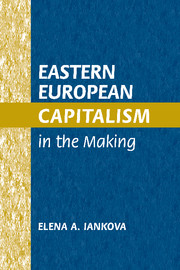Book contents
- Frontmatter
- Contents
- Acknowledgments
- List of Abbreviations
- 1 Hybrid Capitalism in the Making
- 2 The Corporatist Legacy of State Socialism
- 3 Bulgaria's National Tripartism
- 4 National Social Dialogue in Poland
- 5 The Politics of Sectoral Tripartism
- 6 The Politics of Regional Tripartism
- 7 Conclusions: Transiency and Continuity
- Tables
- References
- Index
6 - The Politics of Regional Tripartism
Published online by Cambridge University Press: 30 July 2009
- Frontmatter
- Contents
- Acknowledgments
- List of Abbreviations
- 1 Hybrid Capitalism in the Making
- 2 The Corporatist Legacy of State Socialism
- 3 Bulgaria's National Tripartism
- 4 National Social Dialogue in Poland
- 5 The Politics of Sectoral Tripartism
- 6 The Politics of Regional Tripartism
- 7 Conclusions: Transiency and Continuity
- Tables
- References
- Index
Summary
Regional Social Dialogue in Bulgaria
To reduce their overwhelming involvement in the resolution of locally based social problems and protests, in 1990 the Bulgarian national social partners negotiated the development of social dialogue at the regional level. Tripartite regional agreements were to be signed, replicating the national General Agreement in its major areas. Regional tripartite bodies were to be established with the task of monitoring the implementation of the regional agreements.
The first regional tripartite agreement and tripartite forum emerged in early 1990 in the small city of Razlog.1 Created spontaneously to combat social tension resulting from the collapse of the city's major employer — an electronics company — which caused unemployment in the region to rocket 50 percent, the Razlog forum involved extensive participation of upper-level ministerial and union structures.2 Similar forums followed in other regions.
A regional tripartite commission typically included representatives of the local government (the mayor or deputy-mayor), local unions (Podkrepa CL and CITUB), and the local employers' structures. Initially, the lack of regional structures in both Podkrepa and some of the employers' organizations retarded the development of regional social dialogue. Thus, while the Statute of the National Tripartite Commission recommended the formation of regional commissions in 242 of the 273 municipalities in Bulgaria, by the end of 1991 only about fifty municipal tripartite commissions had been established.
- Type
- Chapter
- Information
- Eastern European Capitalism in the Making , pp. 148 - 171Publisher: Cambridge University PressPrint publication year: 2002



